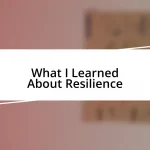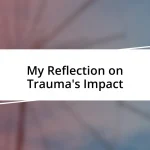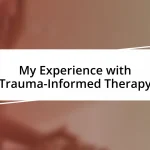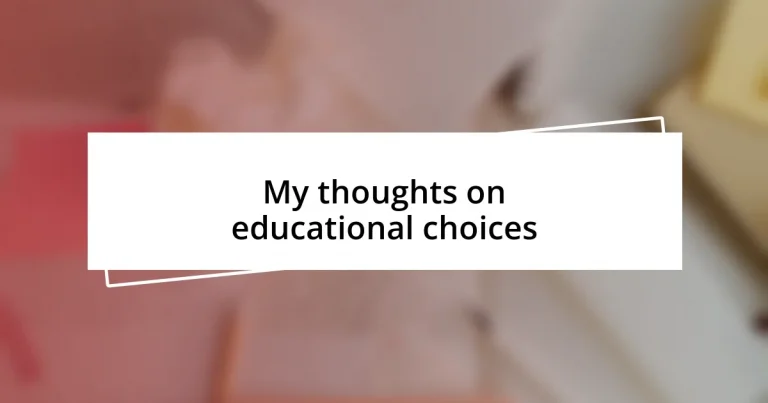Key takeaways:
- Assessing personal educational goals helps clarify one’s passions and align studies with personal values.
- Exploring diverse educational pathways, from traditional colleges to vocational training, is essential for finding the right fit for individual learning styles.
- Financial considerations play a crucial role in educational choices, with budgeting and scholarships influencing decisions.
- Making informed decisions through research and consulting with mentors can significantly impact educational success and future career paths.
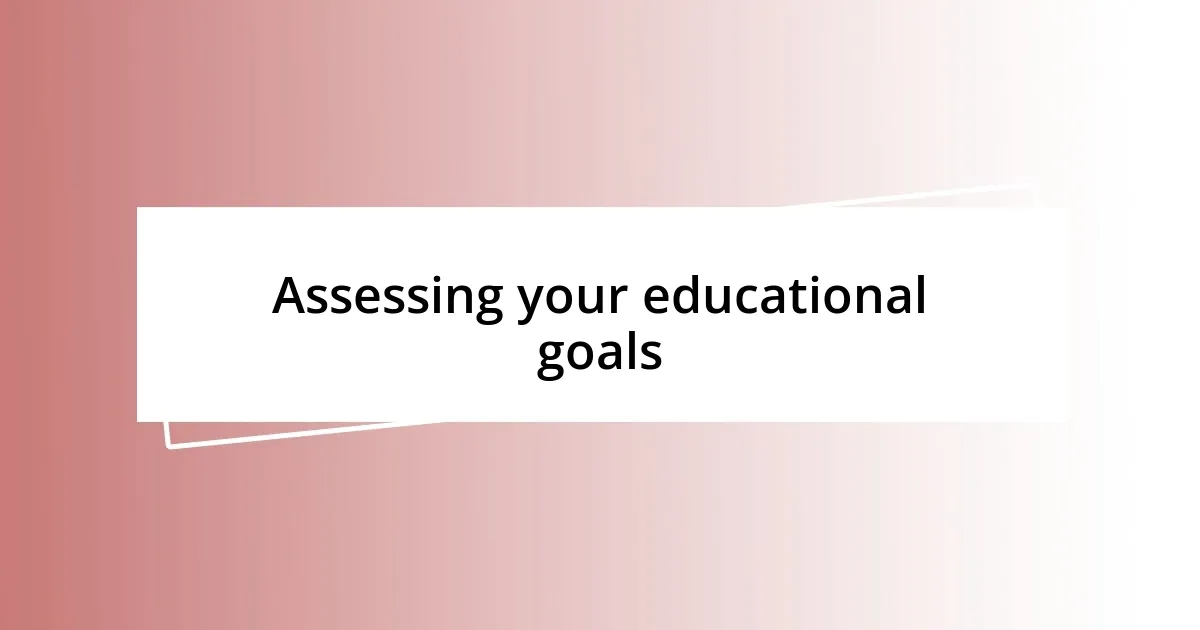
Assessing your educational goals
When I reflect on my own educational journey, I realize that assessing my goals was pivotal in shaping my path. I often ask myself, “What do I truly want to achieve?” This introspection helped me identify that my passion lay in helping others learn, ultimately guiding me towards a career in education.
It’s crucial to break down what success looks like for you personally. For example, during my early college days, I found myself torn between pursuing a practical degree and following my love for the arts. By evaluating the long-term implications of each option, I discovered the importance of aligning my studies with my values—something I encourage you to consider as well.
Have you ever felt overwhelmed by the multitude of options available in education? I remember that once I took time to prioritize my interests and strengths, everything became clearer. It’s all about creating a path that resonates, so you can lay a foundation for not just a career, but a fulfilling life.
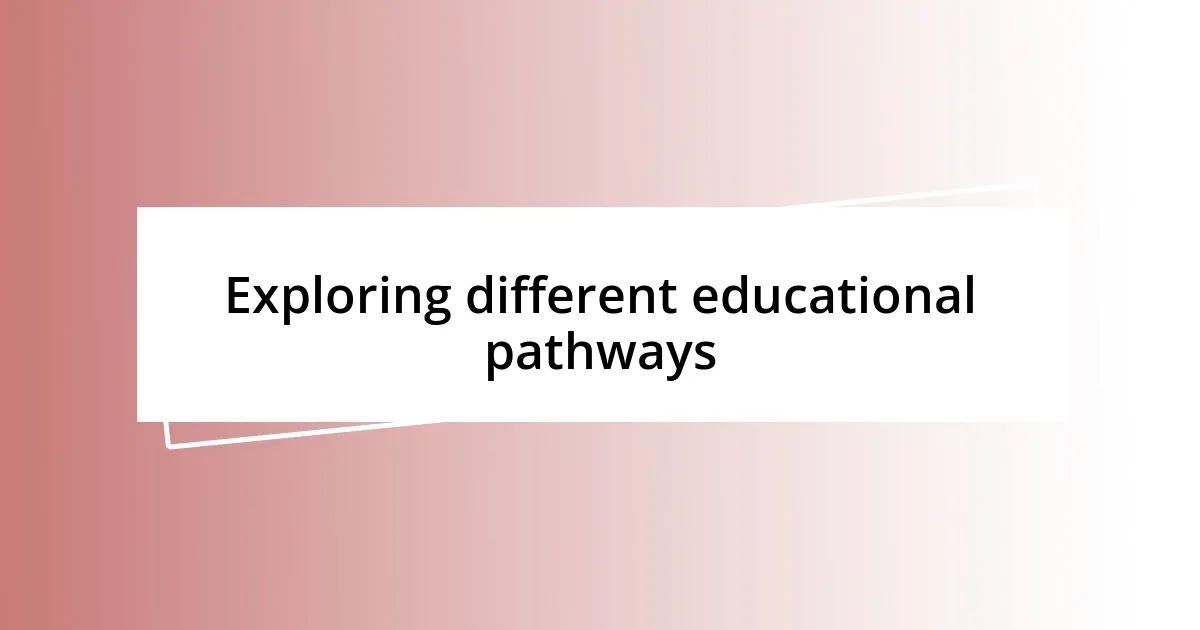
Exploring different educational pathways
Exploring various educational pathways can feel like navigating a vast landscape filled with limitless opportunities. I distinctly remember my first encounter with alternative education, where I attended a workshop on experiential learning. The idea that education could extend beyond the confines of a traditional classroom was liberating. It reminded me that learning can happen in diverse forms, whether through hands-on experiences or digital platforms.
Here are some pathways to consider:
- Traditional College: A conventional route with structured programs, often leading to a degree.
- Community College: Offers a more affordable option and flexibility to explore different fields.
- Vocational Training: Practical training for specific trades, focusing on skill development and immediate job readiness.
- Online Learning: Convenient and self-paced, catering to those seeking knowledge without the constraints of physical classrooms.
- Apprenticeships: A combination of on-the-job training and classroom instruction, ideal for gaining practical experience in a field.
Reflecting on my own journey, I see how each pathway aligns differently with individual passions and career aspirations. Engaging with these options requires you to ask, “What way best suits my learning style?” It’s an essential question that can lead to a more fulfilling educational experience.
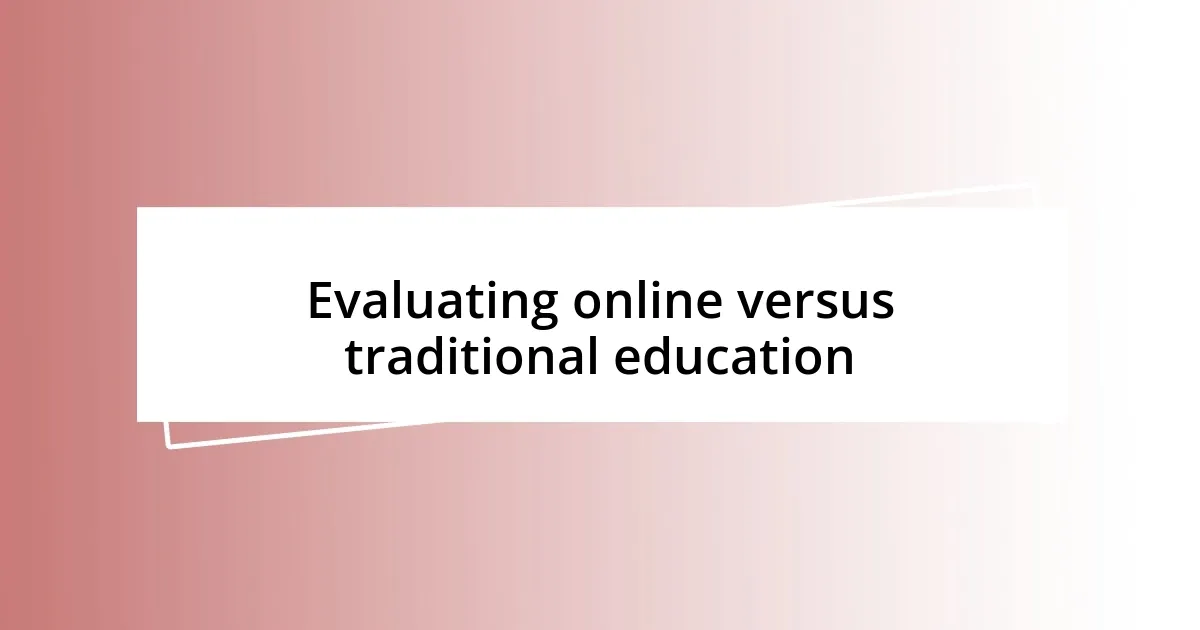
Evaluating online versus traditional education
When I think about the distinctions between online and traditional education, it’s like comparing apples and oranges. Traditional education, with its structured routines, provided me with invaluable face-to-face interactions. I remember how exhilarating it felt to engage in spontaneous discussions with my peers, something that online platforms sometimes struggle to replicate. However, I also discovered the power of online learning, especially during my late-night study sessions when I could access lectures at my convenience. Each mode has its own unique benefits, and the choice ultimately comes down to personal preference and lifestyle.
On the other hand, one can’t ignore the flexibility that online education offers. I recall a time when balancing a part-time job and school became overwhelming. Finding an online course allowed me to tailor my learning around my schedule, granting me the freedom to excel in both areas simultaneously. Yet, I sometimes found myself yearning for that interactive dynamic that in-person classes foster. Can online classes genuinely fill that social gap? It’s a conversation worth having.
In terms of resources, both styles have merits. Traditional education often comes with established networks and resources like libraries and academic counselors, which I found beneficial when I faced challenges. However, the digital world serves up a buffet of online resources, often at your fingertips, just a click away. While both educational paths have their strengths, understanding what you value most can help you decide which option aligns better with your aspirations and lifestyle.
| Online Education | Traditional Education | |
|---|---|---|
| Flexibility | High | Low |
| Interaction with Peers | Variable | High |
| Access to Resources | Extensive (Online) | Established (On-campus) |
| Learning Environment | Self-paced | Structured |
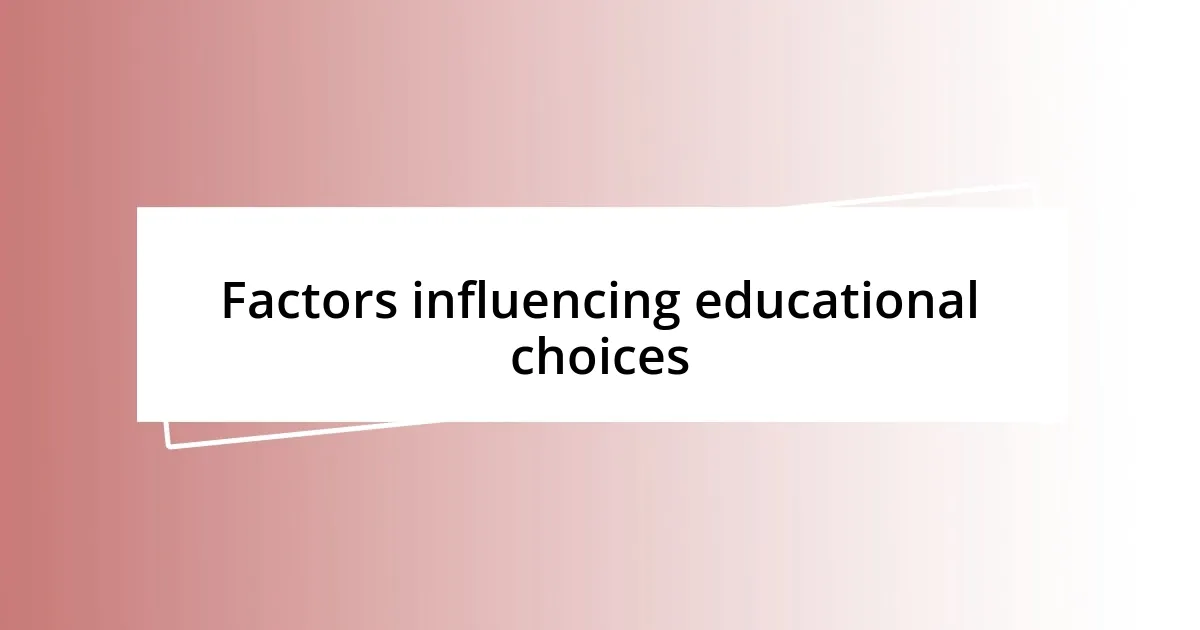
Factors influencing educational choices
When it comes to educational choices, one significant factor is the level of support from family and mentors. I still remember the day my mom encouraged me to pursue my interests in the arts rather than pushing me towards a more traditional path. Her unwavering support helped shape my decision to enroll in a specialized program that celebrated creativity. Have you ever felt that a strong support system could be the push you need to follow your passion? I believe that when our circles believe in our potential, we’re more likely to take risks and explore paths that truly resonate with us.
Another critical factor is financial considerations. Throughout my educational journey, budgeting played a constant role in my decisions. I recall weighing the cost of a prestigious university against community college options. While the allure of a big-name school was enticing, the thought of crippling student debt made me pause. Have you ever faced a similar dilemma? Balancing aspirations with financial reality can be tough, but I learned that there are often scholarships or grants available that can open doors you might not have considered.
Lastly, personal interests and career goals deeply influence educational paths. I can recall a pivotal moment when I was torn between pursuing business or environmental science. After engaging in a few career expos, I realized my passion for sustainability outweighed traditional business roles. This self-discovery process taught me that reflecting on my core values and interests is crucial for making informed choices. Have you taken the time to explore what truly excites you? Understanding ourselves better can lead to richer educational experiences that align with our personal and professional aspirations.
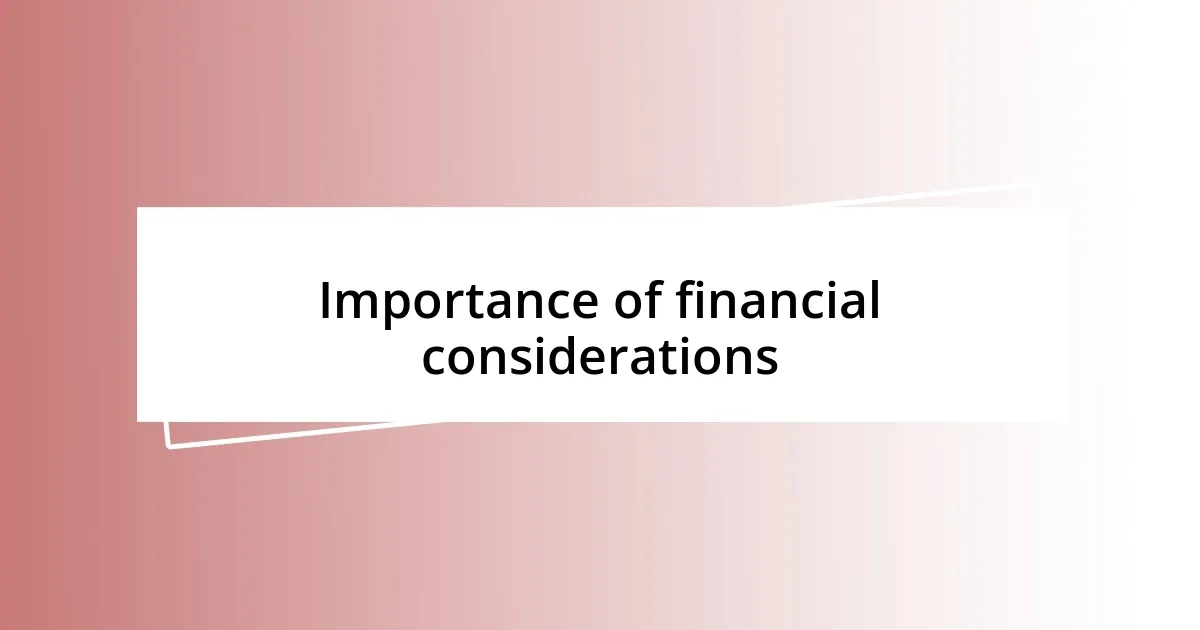
Importance of financial considerations
The importance of financial considerations in education can’t be understated. I remember sitting in my tiny college dorm room, staring at my budget spreadsheet, desperately trying to map out how to make my finances stretch. It struck me that every choice I made, whether to take a few extra credits or engage in an internship, hinged on whether I could afford it. Have you ever felt that weight? It’s a balancing act that I learned to navigate over time.
Planning for expenses forces us to confront our priorities. There was a moment when I had my heart set on a prestigious internship that was unpaid. For a split second, I was ready to overlook the financial implications. Then reality hit: could I really afford to work for free? I reassessed my options and found a paid internship that aligned with my goals. It wasn’t just about gaining experience anymore; it was about making sure I could live and thrive while pursuing my dreams.
Moreover, understanding financial aid options is essential. I’ll never forget the moment I discovered a scholarship opportunity that perfectly matched my career interests. It illuminated a path that seemed daunting, making higher education feel more attainable. Have you explored all your financial avenues? Scholarships and grants can be the lifeline you didn’t know you needed, making that dream education a reality rather than an unattainable goal.
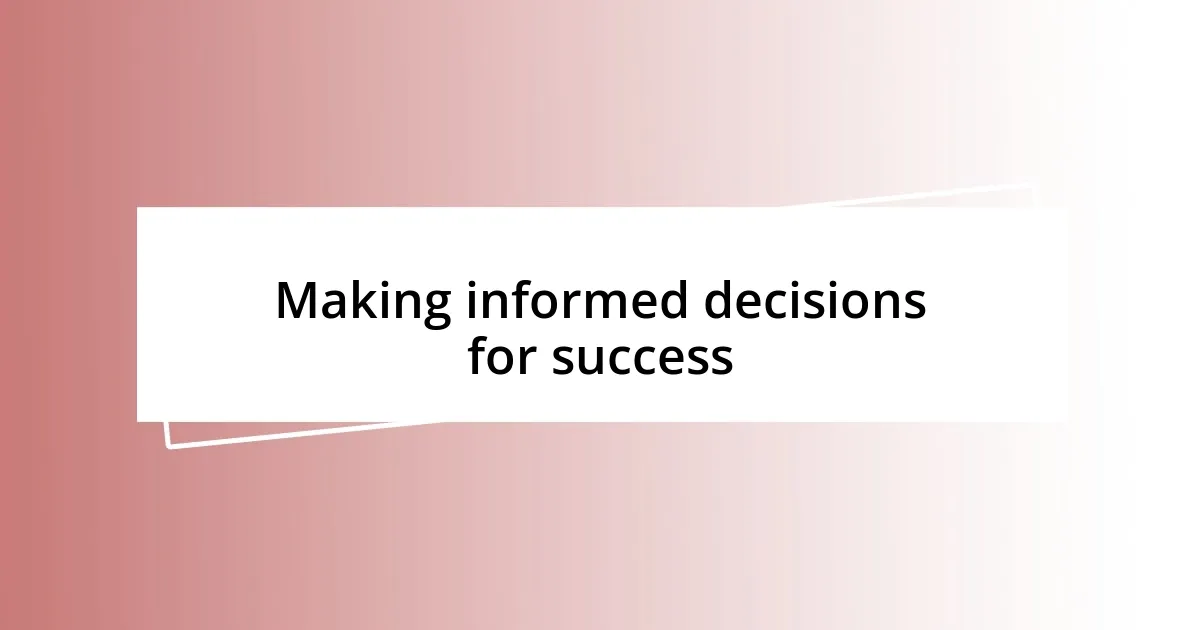
Making informed decisions for success
Making informed decisions in education can significantly shape our futures. I vividly recall the time I was offered a chance to study abroad. While the experience promised to be transformative, I had to weigh it against the cost of living and tuition in a foreign country. Have you ever faced an opportunity that seemed fantastic yet daunting? I learned to dig deep—researching grants specific to international studies—before deciding to embark on that adventure.
Researching educational options has taught me that knowledge is power. There was a point when I considered switching majors halfway through my degree. I remember poring over course catalogs and speaking to alumni about their experiences. As I gathered insights, I realized that a hasty choice could derail my long-term goals. This deliberate approach not only provided clarity but also built my confidence in my decisions. Have you spent time weighing your options thoroughly? I found that making a list of pros and cons helped me see what really mattered to me.
Consulting with mentors has also been invaluable. I remember a late-night coffee chat with a professor who had guided countless students through their academic journeys. Their perspective opened my eyes to less obvious pathways in my field that aligned better with my aspirations. Have you reached out to someone who can provide that kind of insight? I believe that engaging with mentors can illuminate options we might overlook on our own, enhancing our ability to make truly informed decisions.
